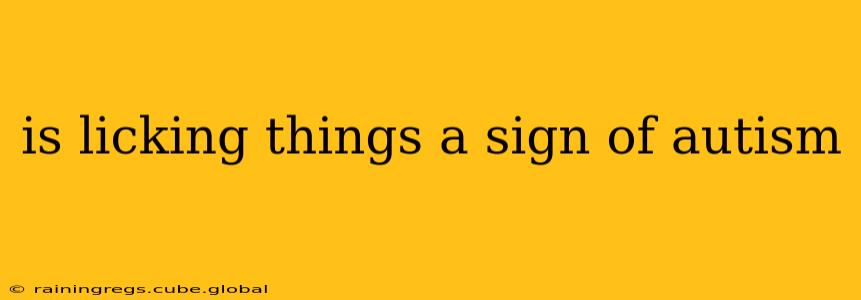Is Licking Things a Sign of Autism? Understanding Sensory Sensitivities and Repetitive Behaviors
Licking objects isn't automatically a sign of autism, but it can be associated with some of the sensory sensitivities and repetitive behaviors sometimes seen in autistic individuals. It's crucial to understand that autism is a complex neurodevelopmental condition with a wide spectrum of presentations. What might be considered atypical behavior in one person is completely normal in another. Therefore, observing a single behavior like licking objects shouldn't be used to diagnose autism.
What are Sensory Sensitivities in Autism?
Many autistic individuals experience sensory sensitivities, meaning they perceive sensory input (touch, sound, taste, smell, sight) differently than neurotypical individuals. This difference can lead to either hypersensitivity (over-reactivity to stimuli) or hyposensitivity (under-reactivity to stimuli). A child might lick an object because the texture or taste provides a calming or satisfying sensory experience, compensating for an overwhelming environment or an unmet sensory need. For example, licking a smooth, cool surface might provide a calming sensation to someone overwhelmed by noisy surroundings.
What are Repetitive Behaviors in Autism?
Repetitive behaviors, also known as stereotypies, are another common characteristic of autism. These are repeated actions, often performed in a ritualistic way, that can provide comfort or self-regulation. Licking an object could fall under this category, becoming a comforting routine for the individual. It's important to distinguish between harmless repetitive behaviors and behaviors that are self-injurious or disruptive.
Could Licking Objects Be a Sign of Something Else?
Licking objects can be associated with other conditions or developmental delays beyond autism. For instance, pica, a disorder characterized by persistent eating of non-nutritive substances, might involve licking objects. Oral sensory-seeking behaviors can also manifest in other developmental conditions. It is crucial to consult a medical professional for proper diagnosis and to rule out other possible underlying issues.
How Can I Tell If My Child's Licking is Concerning?
If you're concerned about your child's licking behavior, it's crucial to consult with a pediatrician or other healthcare professional. They can conduct a thorough assessment, considering other behaviors and developmental milestones, to determine if there's cause for concern. If autism is suspected, they'll likely recommend a comprehensive evaluation by a specialist experienced in diagnosing autism spectrum disorder (ASD).
What are the next steps if I am worried about my child's development?
Observing your child's behavior is essential, but it's not a substitute for professional evaluation. If you have concerns about your child's development, including their sensory behaviors, it's crucial to schedule an appointment with a pediatrician or developmental specialist. Early intervention can be significantly beneficial for children with autism or other developmental conditions. They can provide guidance, support, and appropriate interventions to help your child thrive.
Is it normal for children to lick things?
It's quite common for young children to explore their world through their mouths, including licking objects. However, the persistence, frequency, and context of licking are important factors to consider. If it becomes excessive or persistent beyond typical toddler exploration, it's worth discussing with a healthcare professional.
Disclaimer: This information is intended for educational purposes only and does not constitute medical advice. It's essential to seek professional help for any concerns about a child's development or behavior. A comprehensive evaluation by a qualified professional is necessary for an accurate diagnosis and appropriate intervention strategies.
